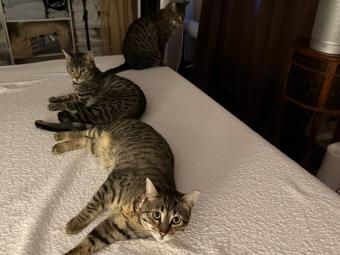
If you need the perfect insult for your enemies (or just your SO when they steal the TV remote) or a gorgeous word to describe your special someone, it's time to look beyond the everyday, boring terms in modern English. Turn with us, oh gentle bócrædereas (readers), to these totally useful Old English words instead.
Since Old English word lists and translators can be a little overwhelming to use, we sorted through lots of them to come up with these useful and beautiful words for you to work into your regular life.
Old English Words for I, Me, and We

When it comes to language (any language), we have to start with words for ourselves. That's why babies learn pretty early on to say "Mine!" when they snatch back a toy or a snack.
These are some of the Old English words for I, me, we, and other pronouns you might need to use:
- ic - I
- wit - we two or both of us
- we - we
- me - me
- unc - the two of us
- us - us
What's super interesting about Old English pronouns is that they used to exist for two people (like an implied "both of us"), and that's something we just don't have in modern English. It's a really intimate and sweet way to show the size of the group you're talking about, and there's just no modern English equivalent. We're all for bringing back "wit" and "unc."
Words to Talk to People in Old English

Language is all about communication, right? That means you kind of need to have people to talk to. Old English has a couple of major advantages over modern English here.
The first big advantage is there are Old English pronouns for talking to two people (both of you), which is really handy if you're even in a group and only want to address a couple of people:
- git - you two
- incer - the two of yours
The second big pro of Old English here is when you're talking to a group of mixed gender people. You know how it's kind of falling out of favor to say "you guys" (hello, gender bias) and "y'all" just doesn't feel natural to everyone? Well, Old English has the answer. It's ge, which basically means "y'all."
Old English Terms of Endearment

Looking for some new ways to address your special someone? Old English has you covered.
- leof - my love
- sinchroden - one who is treasure-adorned
- myn lyking - the one who pleases me
- minra eagna leoht - one who is the light of my eyes
- ælfscyne - beautiful as a fairy
- min meregrot - my pearl
Say "meregrot" out loud (pronounced pretty much how it looks). Does it sound like a name? It's the origin of the name "Margaret."
Old English Insults to Use on Your Enemies

Now that you know what to call people you love, it's worth learning a few things to call people you're really mad at. Next time you're in a fight with your sibling, SO, or frenemy, pull out one of these beauties:
- aglæca - monster
- andsaca - enemy
- bar - boar
- nædre - snake
- wyrm - worm
Wondering how to pronounce some of these words? Even though Old English isn't really spoken anymore, Old English Online has a really handy pronunciation guide to help you say these words correctly.
Beautiful Old English Words for Emotions

While you might not think of generations past as talking about their feelings, emotion is just a huge part of being human. These are a few useful Old English words for emotions:
- anda - malice or anger
- ellen - courage
- hyht - hope
- ar - mercy
- bysmor - disgrace
- dream - joy
- ege - fear
Touching Old English Words for Loss and Sadness

Old English was spoken from about 450 CE to 1150 CE, and that wasn't the easiest time to be alive (think war, plague, disease, no streaming services or takeout). It's no surprise that Old English has tons of words related to suffering and grief:
- bealu - misery
- sorg - grief
- benn - a wound
- cringan - to die or perish
- begnornian - to lament
- dreogan - to suffer
- gnornian - to mourn
Food-Related Words in Old English

As one of our basic human needs, food is pretty important in any language, and Old English is no exception. These are some useful Old English words related to food:
- hlaf - bread
- hlaford - person in charge of the baking the bread
- foda - food
- hunig - honey
- æppelwin - cider (apple-wine)
- flæscmete - meat
- briw - soup made with grain
Sign up for our newsletter featuring all the latest stories and products we love.
Old English Words That Don't Have Modern Counterparts

You know how it's sometimes impossible to find the perfect word for a feeling or situation? Old English has the answer to some of those times with these words we really think need to be brought back into common usage:
- hyge - courage of the mind and heart
- samod - all at once or at the same time
- wyrcan - to create in a tangible way
- wen - a positive expectation of something that will happen
- wyrd - an event which was always going to happen
Toss a Few Old English Words Into the Conversation

While it might not always be the perfect time to toss an Old English word into the conversation (it's an easy way to confuse kids or annoy your boss, for instance), you'll find plenty of opportunities to work these beauties into the conversation. We think you should start with the endearments. After all, who can resist being called ælfscyne (beautiful as a fairy)?







